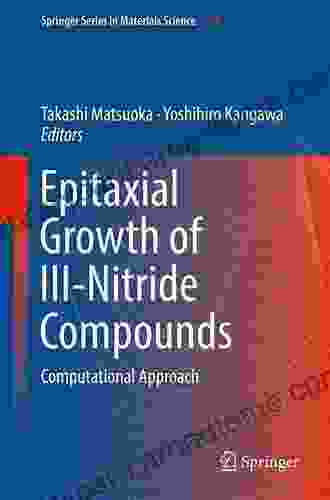Computational Approach in Materials Science: Unlocking New Frontiers

5 out of 5
| Language | : | English |
| File size | : | 16635 KB |
| Text-to-Speech | : | Enabled |
| Screen Reader | : | Supported |
| Enhanced typesetting | : | Enabled |
| Print length | : | 395 pages |
Materials science, the study of the structure, properties, and applications of materials, has been at the forefront of scientific advancements for decades. With the advent of computational approaches, the field has witnessed a transformative shift, enabling researchers to delve deeper into the intricacies of materials at the atomic and molecular levels.
Computational Modeling: A Powerful Tool for Materials Exploration
Computational modeling techniques have opened up unprecedented avenues for exploring materials properties and behaviors. Density functional theory (DFT),molecular dynamics (MD),and machine learning (ML) algorithms are among the most widely used computational methods in materials science.
- Density Functional Theory (DFT): DFT is a first-principles method that calculates the electronic structure of materials. It allows researchers to predict the properties of materials based on their atomic composition and arrangement.
- Molecular Dynamics (MD): MD simulations provide insights into the dynamic behavior of materials at the atomic scale. They can be used to study phenomena such as diffusion, phase transitions, and mechanical properties.
- Machine Learning (ML): ML algorithms can learn from experimental data and discover patterns that enable the prediction of materials properties. This can accelerate materials design and discovery.
Applications of Computational Approaches in Materials Science
Computational approaches have found widespread applications in various areas of materials science, including:
- Materials Design: Computational modeling enables the rational design of materials with specific properties tailored for desired applications.
- Materials Characterization: Computational simulations complement experimental techniques, providing detailed information about materials structure and properties at the atomic level.
- Materials Optimization: Computational approaches can help optimize materials performance by identifying and modifying their microstructures.
- Materials Discovery: Computational screening methods can accelerate the discovery of new materials with novel properties.
Latest Advances in Computational Materials Science
The field of computational materials science is constantly evolving, with new advances emerging rapidly. Some of the latest developments include:
- High-Throughput Simulations: High-throughput simulations enable the screening of a large number of materials for specific properties, accelerating materials discovery.
- Multiscale Modeling: Multiscale modeling techniques bridge different length and time scales, providing a comprehensive understanding of materials behavior.
- Artificial Intelligence (AI): AI algorithms are being integrated into computational materials science, enhancing the accuracy and efficiency of simulations.
Computational Approach in Materials Science 269: A Comprehensive Guide
The book "Computational Approach in Materials Science 269" provides a comprehensive overview of the computational methods and applications in the field. It covers the fundamental principles, advanced techniques, and cutting-edge developments in computational materials science.
Authored by leading experts, the book offers in-depth insights into:
- Density functional theory and its applications
- Molecular dynamics simulations for materials properties
- Machine learning for materials design
- High-throughput and multiscale modeling
- Case studies of computational approaches in materials discovery and optimization
Computational approaches have revolutionized materials science, empowering researchers and professionals to explore materials at the atomic level and push the boundaries of innovation. The advancements in computational modeling techniques, such as DFT, MD, and ML, have enabled the prediction, characterization, optimization, and discovery of materials with unprecedented accuracy and efficiency.
The book "Computational Approach in Materials Science 269" serves as an invaluable resource for researchers, students, and industry professionals seeking to harness the power of computational approaches to advance their work in materials science and engineering.
5 out of 5
| Language | : | English |
| File size | : | 16635 KB |
| Text-to-Speech | : | Enabled |
| Screen Reader | : | Supported |
| Enhanced typesetting | : | Enabled |
| Print length | : | 395 pages |
Do you want to contribute by writing guest posts on this blog?
Please contact us and send us a resume of previous articles that you have written.
 Book
Book Novel
Novel Page
Page Chapter
Chapter Text
Text Story
Story Genre
Genre Reader
Reader Library
Library Paperback
Paperback E-book
E-book Magazine
Magazine Newspaper
Newspaper Paragraph
Paragraph Sentence
Sentence Bookmark
Bookmark Shelf
Shelf Glossary
Glossary Bibliography
Bibliography Foreword
Foreword Preface
Preface Synopsis
Synopsis Annotation
Annotation Footnote
Footnote Manuscript
Manuscript Scroll
Scroll Codex
Codex Tome
Tome Bestseller
Bestseller Classics
Classics Library card
Library card Narrative
Narrative Biography
Biography Autobiography
Autobiography Memoir
Memoir Reference
Reference Encyclopedia
Encyclopedia Alicia L Anderson
Alicia L Anderson Alex Kotlowitz
Alex Kotlowitz Robert Ross
Robert Ross Pearl S Buck
Pearl S Buck George Ellis
George Ellis Bill Clements
Bill Clements Debbie Ann Ice
Debbie Ann Ice Alyssa Favreau
Alyssa Favreau Alan Weiss
Alan Weiss Alex Kendall
Alex Kendall Amanda Smith
Amanda Smith David I Kertzer
David I Kertzer Alex Boten
Alex Boten Colleen Ann Norman
Colleen Ann Norman Alejandro Lugo
Alejandro Lugo Alberto Paoluzzi
Alberto Paoluzzi Alasdair Cameron
Alasdair Cameron Sivajith P R
Sivajith P R Ashley Lin
Ashley Lin Patrick Jenning
Patrick Jenning
Light bulbAdvertise smarter! Our strategic ad space ensures maximum exposure. Reserve your spot today!

 Robert Louis StevensonKeeping Russian Words in Mind Forever: The Ultimate Guide to Memorizing...
Robert Louis StevensonKeeping Russian Words in Mind Forever: The Ultimate Guide to Memorizing...
 Tom ClancyLike What Know: Visual Autobiography - A Window into the Depths of the Human...
Tom ClancyLike What Know: Visual Autobiography - A Window into the Depths of the Human... Jerry HayesFollow ·19.9k
Jerry HayesFollow ·19.9k Pablo NerudaFollow ·3.1k
Pablo NerudaFollow ·3.1k George BellFollow ·17.7k
George BellFollow ·17.7k Aleksandr PushkinFollow ·9.5k
Aleksandr PushkinFollow ·9.5k Ira CoxFollow ·8.6k
Ira CoxFollow ·8.6k Dwight BlairFollow ·16.3k
Dwight BlairFollow ·16.3k Shawn ReedFollow ·17k
Shawn ReedFollow ·17k Amir SimmonsFollow ·16.5k
Amir SimmonsFollow ·16.5k

 Joshua Reed
Joshua ReedBelieving, Living, and Enjoying by the Word: Unlock the...
In a world filled with...

 Cason Cox
Cason CoxUnveil the Extraordinary World of "The Alexiad": A...
Delve into the Heart of Byzantine...

 Junot Díaz
Junot DíazUnveiling the Intricacies of Intellectual Property: Your...
In today's knowledge-driven economy,...

 Aleksandr Pushkin
Aleksandr PushkinThe Life of Louise Mathew Gregory: A Tapestry of Triumphs...
A Woman of Extraordinary Substance Louise...

 Leon Foster
Leon FosterHomemade Lotion For Beginners: Transform Your Skincare...
Step into the world of...

 Terence Nelson
Terence NelsonUnveiling the Secrets of Radio, Television, and Film: An...
: Embarking on a Journey into the...
5 out of 5
| Language | : | English |
| File size | : | 16635 KB |
| Text-to-Speech | : | Enabled |
| Screen Reader | : | Supported |
| Enhanced typesetting | : | Enabled |
| Print length | : | 395 pages |








